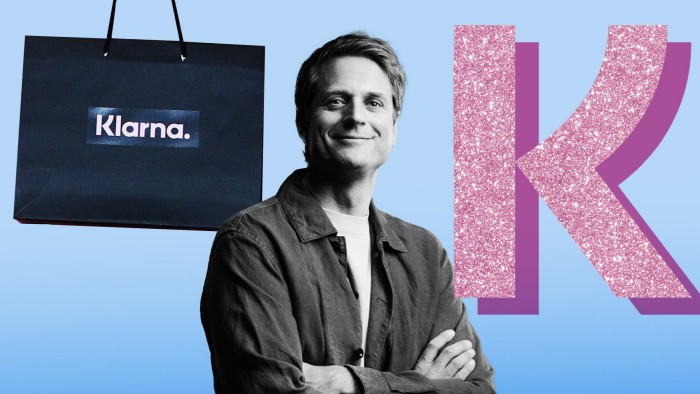As Sebastian Siemiatkowski prepared for an initial public offering of the Swedish “buy now, pay later” fintech he had founded almost two decades earlier, one thing stood in the Klarna chief executive’s way: his co-founder.
Last month Siemiatkowski finally resolved a year-long boardroom tussle, ousting the key board ally of the university friend he formed the company with, former chief financial officer Victor Jacobsson.
Then on Wednesday, with Wall Street fizzing in anticipation of a Donald Trump-era boom, Klarna revealed it had filed long-awaited IPO documents in the US.
Insiders, investors and bankers hope the company can achieve a $15bn-$20bn valuation in a listing. If Siemiatkowski can pull the IPO off, it would mark a redemption for the poster child of the fintech boom and bust: in a financing round in 2021, Klarna was valued at as much as $46bn — then crashed to $6.7bn a year later.
Even at the lower end of the valuation range, the float would mint the 43-year-old former burger-flipper, making him a billionaire. At a $20bn valuation, a personal stake of roughly 8 per cent would be worth about $1.6bn.
“That he can lead the company for 20 years is very remarkable: taking what was a small Swedish company in the beginning into a global business,” said Taavet Hinrikus, the co-founder of London-listed fintech Wise. “It’s really good for the European ecosystem.”
Founded in 2005 after Siemiatkowski and two other student friends unsuccessfully pitched the idea in a university competition, Klarna pioneered the “buy now, pay later” model, which allows customers to delay payments or divide them into instalments.
During its first decade the Stockholm-based company was regularly profitable — until it decided to embark upon a costly push into the US.
The new strategy meant accepting heavy losses as the price of chasing growth: and it was Siemiatkowski chasing it.
Jacobsson, one of Klarna’s trio of co-founders, had already left in 2012, though he retained a stake managed through special purpose vehicles that Klarna estimates at between 4 per cent and 9 per cent. Jacobsson was followed three years later by the second co-founder, deputy chief executive Niklas Adalberth, who sold down and chose a life of philanthropy.
While in the early days “there was a lot of emphasis on not making Klarna a one man show”, according to an early collaborator, the company “has become a one man show”, centred on Siemiatkowski.
Siemiatkowski, or “Seb”, has acquired celebrity status in the Swedish tech scene. He is frequently asked to appear in podcasts and television shows to talk about his journey and his family struggles such as his father’s alcohol addiction and suicide.
He has been vocal about no longer drinking alcohol and spoken about his difficult upbringing in Uppsala, a medieval town 70km north of Stockholm. His parents, two academics who fled communist Poland before his birth in 1981, fell on hard times. His father became a taxi driver and his mother retired early due to illness.
“We would go a full week at a time eating meal after meal of Swedish pancakes, which are essentially nothing more than flour and milk,” Siemiatkowski was quoted as saying in a Sequoia Capital brochure. “My parents couldn’t afford anything else.”
To fund Klarna’s global ambitions, the Swedish executive secured the backing of prominent Silicon Valley investors including Sequoia Capital and Silver Lake, riding a wave of investor hype and cheap money. By 2021, a SoftBank-led funding round had awarded it the crown of Europe’s most valuable start-up, its “pay later” option ubiquitous at the online checkouts enjoying a pandemic-era boom.
Little more than a year later, rapid interest rate rises put an abrupt end to the fintech frenzy, and instead Klarna came under pressure to prove its profit potential — and to supply its investors with an exit.
Many venture capitalists have been unable to monetise their holdings in Klarna since the company began raising funds in the private market more than a decade ago — though there are exceptions. London-based investment firm Permira bought a 10 per cent stake for about $250mn in 2017 and is understood to have sold about half its holding since for $1.7bn.
As CEO Siemiatkowski has tried to shift the fintech’s renowned party culture of the early days to a more professional workplace, people who worked with him said. He has also sought to change the perception of a predatory business reliant on late fees to milk customers, presenting Klarna as a consumer-friendly “AI-powered global payments network and shopping assistant”.
Critical in that has been his relationship with former Sequoia partner and Klarna chair Michael Moritz. Current and former employees describe Siemiatkowski as “uncompromising” and “demanding”. But one former senior employee said Siemiatkowski grew into a better manager once under Moritz’s wing. Another described the duo as having a “father-son” relationship.
It is Moritz who has helped bring Klarna to the doorstep of a US listing — and navigated Siemiatkowski through a power tussle with Jacobsson and his board ally that threatened to derail any float.
The dispute centred on a struggle between the two co-founders and the extent of Siemiatkowski’s influence over the company subsequent to an IPO. After securing the backing of the company’s major investors, it was the Klarna chief who secured victory in a shareholder vote last month.
“Sebastian is more powerful than ever before. The opposition to him is being swept away, bit by bit,” said one friend of his.

With the IPO in sight, the fintech, which is regulated as a bank, has signed up a number of partnerships with merchants in the US to take on its main rival Affirm. It also sold its instant “checkout” payment business for $520mn in June and later struck a deal to offload £30bn worth of its UK loans to hedge fund Elliott to increase its ability to make new loans.
Former executives say that some strategic decisions have raised eyebrows — such as making a number of small acquisitions while the company was lossmaking.
Klarna is also facing a probe from Swedish financial regulators into its financial crime and risk controls. One person close to the company said it had engaged with the regulator about preliminary findings.
Klarna declined to comment for this story.
“Sebastian rightly thinks the success of Klarna is his work. But he has a track record of investing in things that don’t do so well and have been quietly sold off or closed down,” a former senior executive said.
And while Siemiatkowski won the boardroom tussle, the dispute left a bitter taste among some investors, said a person close to the company.
“There are many anti-Seb owners shaking their heads over the civil war,” said one shareholder. But, they added: “Most of them just want the liquidity event to happen and stop scaring future investors.”
Source link









